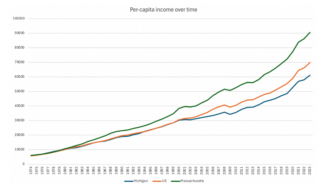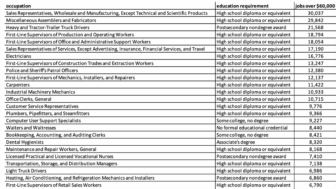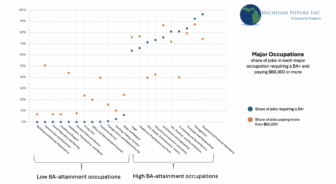
In our state policy agenda we advocate for augmenting wages and benefits through some combination of employer mandates and/or a strengthened safety net. And note that the employer mandate recommendations is the area where we have the most disagreement amongst the Michigan Future board and staff.
What is clear to us is that Michigan cannot reach the goal of rising household income for all unless it finds ways to increase the amount of work and the pay and benefits of that work for those with low-education attainment. It is almost certain that requires augmenting wages and benefits through employer mandates, an expanded safety net, or a combination of both.
In this post we will look at a proposal for creating a capitalist economy that works for all from the political left that relies primarily on employer mandates. In an upcoming post we will look at ideas for creating a capitalist economy that works for all from the political right that relies primarily through an expanded safety net.
Entrepreneur and venture capitalist Nick Hanauer in an article for Democracy Journal entitled Shared Security, Shared Growth lays out an agenda for insuring that capitalism is benefiting all largely through employer mandates. Worth reading.
Hanauer is another capitalist who believes American capitalism needs reforming. He and his co-author David Rolf, start their article by making that case. They write:
In the technological economy of the twenty-first century, growth and prosperity are the consequences of a virtuous cycle between innovation and demand. Innovation is how we solve problems and raise living standards, while consumer demand is how markets distribute and incentivize innovation. It is social, civic, and economic inclusion—the full, robust participation of as many people as possible—that drives both innovation and demand. And inclusion requires policies that secure a thriving middle class.
The trickle-down theory—the one that lionizes the rich as “job creators”—insists that the American middle class is a consequence of growth, and that only if and when we have growth can we afford to include more people in our economy. But trickle-down has it exactly backwards: Properly understood, the middle class is the source of all growth and prosperity in a modern technological economy, and economic security is the essential feature of what it means to be included in the middle class.
Economic security is what frees us from the fear that one job loss, one illness—one economic downturn amidst a business cycle guaranteed to produce economic downturns—could cost us our home, our car, our family, and our social status. It’s what grants us permission to invest in ourselves and in our children, and to purchase the non-subsistence goods and experiences that make our lives healthier, happier, and more fulfilling. It gives us the confidence to live our lives with the realistic expectation of a more prosperous and stable economic future, and to take the entrepreneurial risks that are the lifeblood of a vibrant market economy. A secure middle class is the cause of growth, not its effect; in fact, our economy cannot reach its full potential without it. And a middle class that lives in constant fear of falling out of the middle class isn’t truly middle class at all.
From 1950 through 1980, during the heyday of the Great American Middle Class, a combination of New Deal programs, a corporate culture of civic responsibility, and a powerful labor movement provided a majority of American workers with health insurance, unemployment insurance, workers’ compensation insurance, pensions, job security, rising wages, overtime pay, paid vacation, paid sick days, a 40-hour workweek, and access to affordable, high-quality education. These are the benefits that provide the economic security of a decent and dignified life that defines what it means to be middle class, and that led to an unprecedented increase in living standards and economic growth.
Hanauer and Rolf, understanding that the trend is for more and more of us not to work long term for one employer, propose a 21st Century version of the wages and benefits that provided economic security during what they call the heyday of the Great American Middle Class. They write:
We propose a new Shared Security System that endows every American
worker with, first, a “Shared Security Account” in which to accrue the basic employment benefits necessary for a thriving middle class, and second, a new set of “Shared Security Standards” that complement and reinforce that account.One can think of the Shared Security Account as analogous to Social Security, but encompassing all of the employment benefits traditionally provided by a full-time salaried job. Shared Security benefits would be earned and accrued via automatic payroll deductions, regardless of the employment relationship, and, like Social Security, these benefits would be fully prorated, portable, and universal.
… Within the context of the Shared Security Account, there would be essentially two types of benefits: those that are accrued over time, retaining a specific dollar value, and those that provide insurance against life events, foreseen or otherwise. And the two types of benefits would be accounted for differently.
Mandatory accrued benefits should include a minimum of five days a year of paid sick leave, 15 days a year of paid vacation leave, a matching 401(k) contribution, and the same health insurance premium contribution as currently required under the Affordable Care Act (ideally, health care would fall into the insurance benefit category, but that is a larger battle). Employers—that is to say, whatever entity is paying the worker—would be required to contribute to the worker’s Shared Security Account with each paycheck, with the contributions prorated based on a standard eight-hour day, 40-hour week, and 2,080-hour year.
… Mandatory insurance benefits should include unemployment, workers’
compensation, and paid maternity, paternity, family, and medical leave.
The Shared Security Standards proposed include all employers providing paid leave; a $15 an hour minimum wage; overtime pay for the same 65 percent of salaried workers who were covered in 1975; gender pay equity; and fair scheduling.
Obviously this is a serious proposal to deal with the Great Decoupling. Where the economy grows, but leaves a substantial proportion of American households unable to earn enough to pay the bills, save for their retirements and for the kids’ education. What we most need now is for those who don’t like the employer mandate approach that Hanauer and Rolf take to lay out their alternative for how you have a capitalism that works for all. And have a debate about which of the approaches will work best in meeting the goal of an economy that works for all. What should be off the table is just accepting the Great Decoupling.







